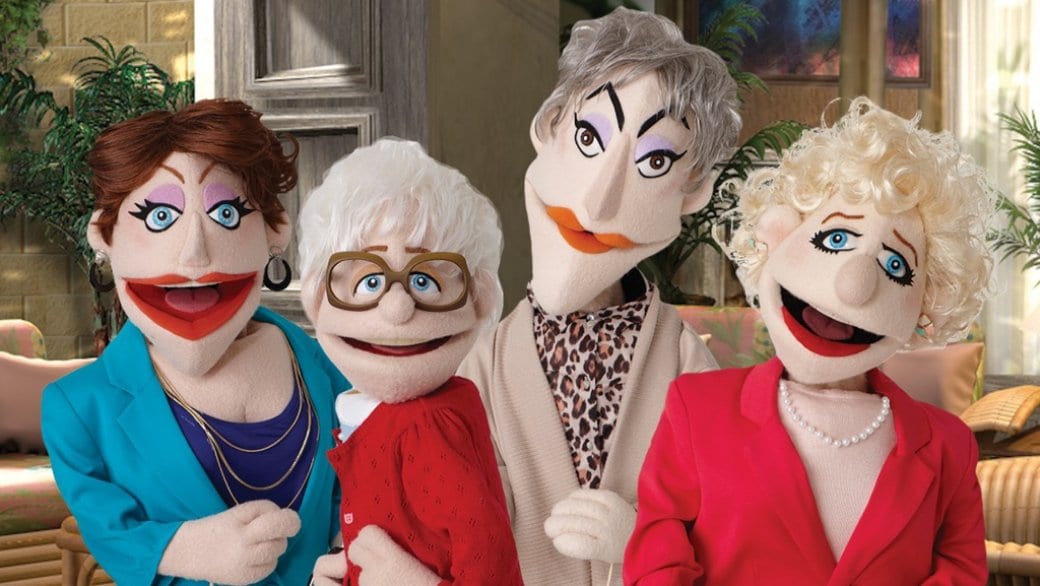Before Looking, before Queer as Folk, before even Will and Grace, The Golden Girls may have been television’s first truly gay show. Four straight women living out their retirement years in Miami doesn’t immediately scream queer TV. Yet the show’s producers peppered it with both overt and coded moments aimed at a gay audience.
Directed by Daily Xtra favourite Bruce Dow, Thank You For Being a Friend is a theatre piece that sees the gals re-imagined as puppets. Built with mostly original material that riffs off of the characters’ lives and loves, the show is chock-full of sex jokes and heavy on gay references. As Toronto prepares for the touchdown of Dorothy, Rose, Blanche and Sophia in felt-form, we take a look back at the gayest moments of the original series.
Isn’t It Romantic?
The first appearance of an openly queer character (aside from Coco the cook who was axed after the pilot) was Dorothy’s college friend Jean.
Still mourning the death of her partner Pat, Jean comes to visit and unexpectedly falls for Rose. The episode reveals a quintessential queer rite of passage: the unrequited crush on a straight person. At the same time, it offers an important lesson to the mainstream world. During a time when queers were often depicted as predators, bent on recruiting heteros to their lascivious ways, the episode presents this kind of attraction for what it is: a basic human need for companionship that shouldn’t be threatening to anyone.
72 Hours
The Golden Girls wasn’t the only show to address AIDS. Still, Rose’s realization she might have been exposed to the virus by a blood transfusion could be one of network TV’s most direct attempts to discuss the subject.
The show addresses people’s irrational fears of infection, as demonstrated in Sophia’s fear of touching anything Rose has handled. It also features an affirmative takedown of slut-shaming, highlighted in the scene in which Blanche loudly proclaims, “AIDS is not a bad person’s disease.”
While the episode tackles many of the fears and prejudices associated with the epidemic, other shows that examined the subject usually dragged out a gay character for a single episode to be the face of the disease. Here it’s presented through the eyes of a 60-year-old straight woman, reminding us of the critical message that while people discriminate, AIDS does not.
Rose scores a job as a production assistant for a local TV station and books Dorothy and Blanche as guests for a talk show. The topic, much to their surprise, turns out to be “Lesbians of Miami.”
Though they’re furious at being tricked into making the appearance, Dorothy and Blanche decide to play along rather than risk costing Rose her job. In a surprisingly sophisticated device, their performance of queerness lampoons 1990s shows like Geraldo and Donahue and their practice of parading queers across the television screen as a means to stoke ratings.
Sister of the Bride
We first meet Blanche’s brother Clayton in Season 4 when he’s struggling to come out and tries to convince the girls he’s shagged Rose. A mere two years later, he’s met a nice guy and looking to tie the knot, much to his sister’s chagrin.
Presenting a happy, sexually active gay couple ready to say “I do” was a radical gesture at a moment when gay sex was still a crime in most of the US. In a surprising exchange with Blanche, Sophia lays out what might be the most clearly articulated case for marriage equality ever seen on network television.
Thank You for Being a Friend
Al Green Theatre, 750 Spadina Ave, Toronto
July 29–Sept 24, 2016
josephpatrickpresents.com


 Why you can trust Xtra
Why you can trust Xtra


